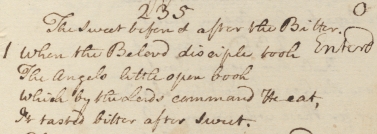|
Olney Hymns Book 1 Hymn 141
When the beloved disciple took...
Manuscript Hymn No. 235

REVELATION
Chapter 10
The Little Book (a)
When the beloved disciple took
The angel's little open book,
Which by the Lord’s command he eat,
It tasted bitter after sweet.
Thus when the gospel is embraced,
At first ’tis sweeter to the taste
Than honey, or the honey-comb,
But there’s a bitterness to come.
What sweetness does the promise yield,
When by the Spirit’s power sealed!
The longing soul is filled with good,
Nor feels a wish for other food.
By these inviting tastes allured,
We pass to what must be endured;
For soon we find it is decreed,
That bitter must to sweet succeed.
When sin revives and shows its power,
When Satan threatens to devour,
When God afflicts, and men revile,
We drag our steps with pain and toil.
When thus deserted, tempest-tossed,
The sense of former sweetness lost,
We tremble lest we were deceived
In thinking that we once believed.
The Lord first makes the sweetness known,
To win and fix us for his own;
And though we now some bitter meet,
We hope for everlasting sweet.
(a) See also Book 3, Hymn 27

|
|
from John Newton's Diary, relevant to this hymn:
Tuesday 20 February 1776
O Lord I am still entangled in a snare from which thy power alone can set me free. Thou only knowest how weak, how vile I am, and how I am self-condemned by the admonitions I give to others in thy name. This evening we aimed to take a view of the Celestial City – But alas – that such a prospect should have no more influence to make me spiritually minded. I believe the things are true, and cannot deliberately question my interest in them. But hardly can there be found, I think, so inconsistent a creature as myself among thy children. O where is the power of that promise, The blood of Jesus cleanseth from all sin? O I am weary of this conflict or rather this succession of shameful defeats, for I cannot even strive, but too often tamely give up the cause. Ah what returns do I make for mercies received, and what farther good do I foolishly keep from myself. Lord help me.
Thursday 22 February 1776
My heart O Lord is like a harp untuned. Oh when wilt thou return with healing under thy wings, and give me victory, that the subject of my preaching this night may be my own language? My sins from first to last, of ignorance, infirmity, omission, are innumerable indeed, and alas my sins of presumption are very numerous, and I have nothing to plead but thy mercy. Thou canst forgive them all, and restore to me the joys of thy salvation. O for a heart to pray in good earnest, and to taste the sweetness of thy word which for the most part is to me a sealed book, and most justly so. I have procured it to myself. My graces languish – an indolence enervates me, I can set about nothing with spirit, nor bring anything to good effect. A great part of my time runs to waste for I have lost the habit of redeeming it. All is wrong – and my desires of amendment are but faint wishings and wouldings rather than persevering wrestlings with thee for returning life. O look down in great mercy and bring my soul out of this prison that I may praise thy name. [lecture:] Psalm 103:3 [(v2: Bless the Lord, O my soul, and forget not all his benefits:) who forgiveth all thine iniquities; who healeth all thy diseases]
Sunday 25 February 1776
I thank thee gracious Lord for support and protection today. I had liberty in public, and though called to an extra service at Clifton, and constrained by the flood to go round, I was neither too weary nor too late for the Great House.
Psalm 45:11
Luke 12:40
Clifton: Psalm 1:2
Hymn No. 235
[On this date Newton preached from the above texts at his church, St Peter & St Paul, Olney, during the morning and afternoon services, and from this hymn at the informal evening service] |
Image copyright:
Hymn: MS Eng 1317, Houghton Library, Harvard University
Diary: John Newton Collection, CO199, Princeton University
|
Marylynn Rouse, 10/09/2013
|
|
|
|